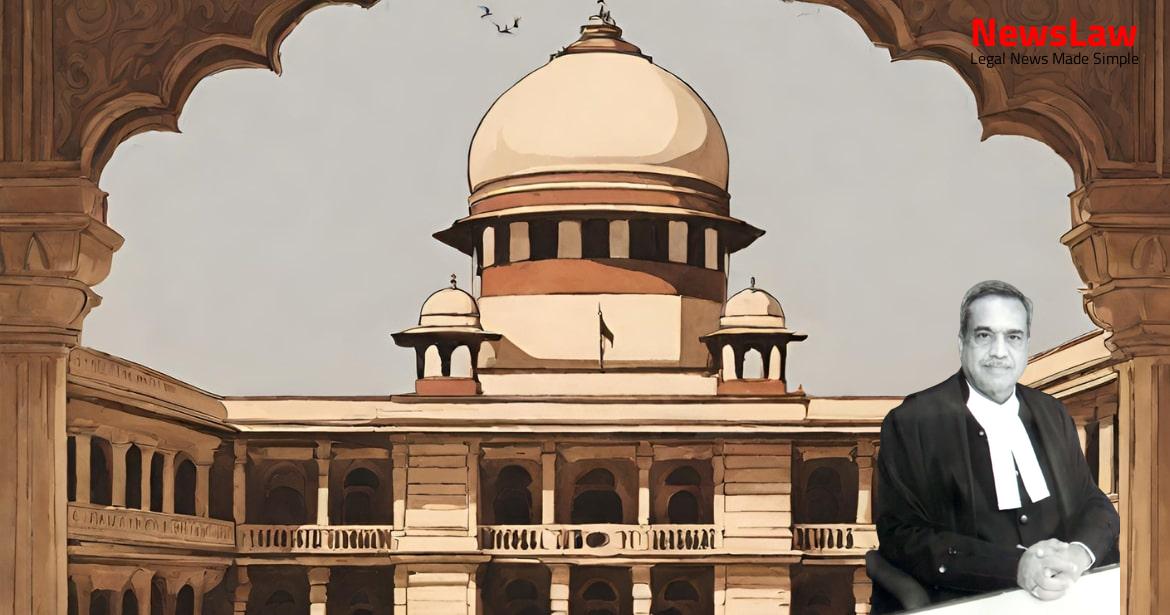The High Court’s decision to quash the FIR in a recent case sheds light on the nuances of legal proceedings and potential abuse of process of law. The court’s analysis underscores the importance of upholding justice while preventing misuse of criminal proceedings. Dive into the details of this case and the implications of the court’s ruling on the legal landscape.
Facts
- The High Court dismissed the writ petition filed by the appellants to quash the FIR registered against them under Sections 420/406 IPC.
- The complainant filed a criminal revision before the Sessions Court, which remanded the case back to the Magistrate for reconsideration.
- The High Court refused to quash the FIR stating that it prima facie discloses a cognizable offence.
- The Magistrate, in an order dated 23.03.2015, directed to treat the application under Section 156(3) as a complaint case under Section 200 Cr.P.C.
- The appellants approached the High Court to quash the FIR filed against them.
- The company terminated the distributorship contract with the complainant due to non-payment of dues.
- An outstanding amount of Rs.9,46,280 was found to be due from the complainant.
- The Sessions Judge quashed the earlier order and remanded the matter to the Magistrate for reconsideration under Section 156(3) Cr.P.C.
- Similar allegations were made in the FIR and the application under Section 156(3) Cr.P.C.
- The complainant filed a complaint under Section 156(3) Cr.P.C. for misappropriation of Rs.31,12,375 against the appellants.
- The Magistrate treated the application as a complaint case and asked for further action from the police.
- A criminal revision application was filed by the complainant against the Magistrate’s order.
- The complainant’s cheque to the company was dishonoured due to insufficient funds.
- VBL appointed the complainant as a distributor for their products in the Loni area.
- The relevant facts for the appeal include the franchise relationship between VBL and PepsiCo.
- Multiple cases and complaints were filed by both parties against each other.
- Investigations and legal proceedings are pending before the Magistrate.
Also Read: Judicial Review of Delayed Writ Petition
Arguments
- Appellants argue that they are wrongfully accused as individuals and not as representatives of the company VBL.
- They claim that for a case under Section 406 IPC to stand, it must be proven that R1 entrusted them personally, not as VBL officers, with commissions/benefits.
- They argue that the FIR is primarily about money owed by the company to R1, not about personal wrongdoing by the individual appellants.
- Appellants allege that the FIR is an attempt at extortion and retaliation, citing precedence in similar cases.
- Opposing, the respondent’s counsel highlights serious allegations of forgery and threat in the FIR against the appellants.
- Respondent argues that the amount due is from the company, but the appellants are accountable due to their roles in the alleged offenses.
- Various legal cases are referenced by both sides to support their arguments.
- Appellants claim that the FIR lacks essential elements for offenses under Section 420 IPC.
- Respondent argues that delay in filing the FIR is not fatal and explains reasons for the delay.
- Further legal arguments are presented regarding the pendency of the Section 156(3) application and its relation to the FIR.
- Reference is made to the powers of the trial court to add charges based on the investigation findings.
- The respondent emphasizes that non-disclosure of the pending application in the FIR is not prejudicial and can be addressed during the trial.
- Appellants assert that the FIR is an abuse of process to harass them and convert a civil dispute into a criminal case.
- Arguments regarding the delay in filing the FIR and the role of the appellants in the company’s operations are presented.
- Discussion on the stay of proceedings before the Magistrate during police investigation is also highlighted.
- The respondent filed an application under Section 156(3) Cr.P.C. due to failure to receive money owed to them.
- The appellants and the company retained an amount in trust after the dealership but did not pay the respondent, leading to allegations of cheating and breach of trust.
- The High Court rightfully refused to quash the FIR as it discloses cognizable offences.
- The company can be included as an accused in the chargesheet by the police after evidence collection.
- Disputing acknowledgements through emails and hard copies does not warrant quashing of the FIR.
- The trial court can summon the company to stand trial as a co-accused under Section 319 Cr.P.C. if the police omit to do so.
- Making a complaint under Section 138 NI Act does not grant immunity for offences committed.
- Appellants are disputing the acknowledgment of Rs. 34,50,418/- as payable to the respondent, which was previously acknowledged through emails and hard copies.
Also Read: Ownership Dispute: Legal Analysis on Admission and Decree
Analysis
- The argument that the FIR should be quashed as there is a pending application under Section 156(3) Cr.P.C. is not accepted as both a complaint case and police investigation can proceed simultaneously.
- Reference to Section 210 Cr.P.C., which allows for both complaint cases and police investigations to proceed in parallel.
- The filing of a subsequent FIR by the original complainant can be seen as an abuse of process of law and an attempt to pressure the accused.
- The High Court has inherent powers to prevent abuse of process of law and secure the ends of justice.
- The argument that the company should have been included as an accused in the FIR is raised.
- Emphasis on not quashing the FIR at the threshold if it discloses cognizable offences, while balancing the need to prevent harassment through criminal proceedings.
- Inherent jurisdiction under Section 482 Cr.P.C. and/or Article 226 of the Constitution can be used to prevent criminal proceedings from becoming a tool for harassment or abuse of process.
- If a report is made by the investigating police officer under section 173 and on such report cognizance of any offence is taken by the Magistrate against any person who is an accused in the complaint case, the Magistrate shall inquire into or try together the complaint case and the case arising out of the police report.
- If the police report does not relate to any accused in the complaint case or if the Magistrate does not take cognizance of any offence on the police report, he shall proceed with the inquiry or trial, which was stayed by him, in accordance with the provisions of the Criminal Procedure Code.
- Section 210 of the Criminal Procedure Code states that when in a case instituted otherwise than on a police report, during the course of the inquiry or trial held by the Magistrate, if it appears that an investigation by the police is in progress in relation to the offence being considered, the Magistrate shall stay the proceedings and call for a report from the police officer conducting the investigation.
- Section 482 Cr.P.C. is prefaced with an overriding provision.
- It empowers the High Court to quash criminal proceedings.
- Exercise of power is aimed at securing the ends of justice.
- Inherent powers can be exercised to prevent abuse of process of any court or otherwise to secure the ends of justice.
- The impugned FIR is considered an abuse of process of law and an attempt to harass the appellants.
- The FIR did not mention the pending application under Section 156(3) Cr.P.C. before the learned Magistrate.
- The High Court should have used its powers under Article 226 of the Constitution of India/482 Cr.P.C. to quash the FIR in the interest of justice.
- The court refrained from commenting on the merits of the case against the appellants as it is still pending before the learned Magistrate.
Also Read: Interpretation of Statutory Limitation under Section 263(2)
Decision
- The impugned criminal proceedings/FIR registered as Case Crime No. 790 of 2017 under Sections 420/406 IPC are quashed and set aside.
- The appeal is allowed with the mentioned observations.
- The learned Magistrate will continue with the 156(3) Cr.P.C application in accordance with the law and its merits.
- Respondent No.1 has the option to proceed further with the said proceedings.
Case Title: KAPIL AGARWAL Vs. SANJAY SHARMA (2021 INSC 132)
Case Number: Crl.A. No.-000142-000142 / 2021



